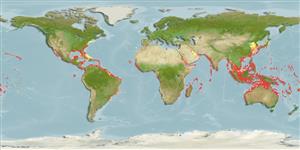(كوسه ها و سپرماهيان) (sharks and rays) >
Myliobatiformes (Stingrays) >
Aetobatidae (Pacific eagle rays)
Etymology: Aetobatus: Greek, aetos = eagle + Greek, batis, batidos = a ray (Raja sp.) (Ref. 45335).
Issue
Status of Aetobatus latirostris Duméril, 1861 requires further investigation. Species information (common names) should be linked to correct species (see Ref. 114963).
Environment: milieu / climate zone / depth range / distribution range
بوم شناسي
دريايي; لب شور موجوداتی که در محدوده وسیعی از آبهای آزاد از نزدیک بستر و یا روی کف بستر، در قسمت های میان آبی تا سطح آب و در برخی گونه ها با قابلیت پرواز، زندگی و تغذیه می کنند.; هردو رو (Ref. 51243); تغييرات عمق 1 - 80 m (Ref. 9710). Subtropical; 36°N - 24°S, 98°W - 15°E
Western Atlantic and probably Eastern Atlantic. Indo-Pacific species refer to Aetobatus ocellatus; Eastern Pacific species refers to A. laticeps.
Length at first maturity / Size / Weight / سن
Maturity: Lm 107.4, range 110 - 120 cm
Max length : 230 cm WD جنس نر / بدون خواص جنسي; (Ref. 114953); common length : 140 cm WD جنس نر / بدون خواص جنسي; (Ref. 114953); بيشينه وزن گزارش شده: 230.0 kg (Ref. 7251)
توصيف مختصر
ريخت شناسي | ريخت ستجي بوسيله انداره گيري
خارهاي باله پشتي (کل): 0; شعاع نرم باله پشتي (کل): 0; خارهاي باله مخرجي 0; شعاع نرم باله مخرجي: 0. An eagleray with a long snout, flat and rounded like a duck's bill, a thick head, and a pectoral disc with sharply curved, angular corners, and no caudal fin; jaws usually with single row of flat, chevron-shaped teeth (Ref. 5578). Each tooth a crescent-shaped plate joined into a band (Ref. 26938). Numerous white spots on black or bluish disc; white below (Ref. 5578). Long whiplike tail, with a long spine near the base, behind small dorsal fin. No spines on disk (Ref. 7251).
Commonly found in coastal habitats to at least 60 m depth (Ref. 114953). Swims close to the surface, occasionally leaping out of the water, or close to the bottom (Ref. 3175). Frequently forming large schools during the non-breeding season (Ref. 7251). Feeds on polychaetes, bivalves, gastropods, cepahlopods, shrimps and small fishes (Ref. 114953). Ovoviviparous (Ref. 50449). Bears young in litters of 2-4 (Ref. 26938, 114953).
Life cycle and mating behavior
بلوغ | تولید مثل | تخم ریزی | تخم ها | Fecundity | توزاد ( لارو)
Exhibit ovoviparity (aplacental viviparity), with embryos feeding initially on yolk, then receiving additional nourishment from the mother by indirect absorption of uterine fluid enriched with mucus, fat or protein through specialised structures (Ref. 50449). Bears up to 4 young (Ref. 5578, 6871, 37816). Width at birth 17-35 cm (Ref. 37816).
According to Uchida et al (1990) (Ref. 51119) 'the male chases the female in mid water, then nibbles on her dorsal surface. The female stops swimming to begin copulation. The male bites the female on a pectoral fin and bends one clasper forward, then attempts an abdomen to abdomen copulation with either clasper, usually mid-water' (Ref. 49562). Copulation lasted for 20 seconds to 1 minute (Ref. 49562).
Last, P.R., W.T. White, M.R. de Carvalho, B. Séret, M.F.W. Stehmann and G.J.P. Naylor, 2016. Rays of the world. CSIRO Publishing, Comstock Publishing Associates. i-ix + 1-790. (Ref. 114953)
وضعيت در فهرست قرمز IUCN (Ref. 130435)
خطر برای انسان ها
Traumatogenic (Ref. 4690)
استفاده انسانی
ماهي گيري – شيلات: ارزش تحاري اندك
اطلاعات بيشتر
مراجعآبزي پرورينمايه آبزي پرورينژادهاژنتيكElectrophoresesوارثبيماري هافرآوریNutrientsMass conversion
ابزارها
گزارش های ويژه
بارگيری XML
منابع اينترنتي
Estimates based on models
Preferred temperature (Ref.
123201): 22.3 - 29, mean 27.5 °C (based on 4014 cells).
Phylogenetic diversity index (Ref.
82804): PD
50 = 0.6250 [Uniqueness, from 0.5 = low to 2.0 = high].
Bayesian length-weight: a=0.01000 (0.00244 - 0.04107), b=3.04 (2.81 - 3.27), in cm total length, based on all LWR estimates for this body shape (Ref.
93245).
Trophic level (Ref.
69278): 4.2 ±0.1 se; based on diet studies.
جهندگی (Ref.
120179): خیلی آهسته, كمينه زمان لازم براي دو برابر شدن جمعيت بيش از 14 سال (tm=4-6; Fec=1-2).
Prior r = 0.06, 95% CL = 0.04 - 0.10, Based on 1 stock assessment.
Fishing Vulnerability (Ref.
59153): Very high vulnerability (85 of 100).
Nutrients (Ref.
124155): Calcium = 9.92 [1.89, 44.45] mg/100g; Iron = 0.495 [0.123, 1.361] mg/100g; Protein = 22 [17, 27] %; Omega3 = 0.253 [0.077, 0.713] g/100g; Selenium = 25.2 [7.7, 73.8] μg/100g; VitaminA = 8.16 [2.83, 22.84] μg/100g; Zinc = 0.526 [0.255, 0.991] mg/100g (wet weight);
